一般将来时总结
一般将来时用法总结
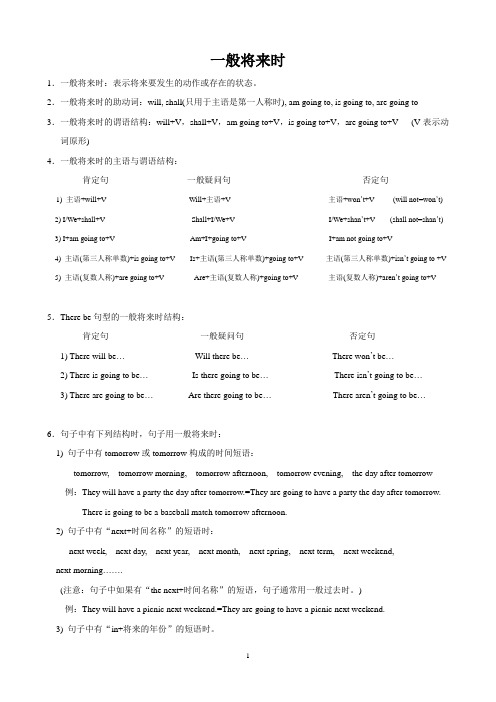
一般将来时1.一般将来时:表示将来要发生的动作或存在的状态。
2.一般将来时的助动词:will, shall(只用于主语是第一人称时), am going to, is going to, are going to3.一般将来时的谓语结构:will+V,shall+V,am going to+V,is going to+V,are going to+V (V表示动词原形)4.一般将来时的主语与谓语结构:肯定句一般疑问句否定句1) 主语+will+V Will+主语+V 主语+won’t+V (will not=won’t)2) I/We+shall+V Shall+I/We+V I/We+shan’t+V (shall not=shan’t)3) I+am going to+V Am+I+going to+V I+am not going to+V4) 主语(第三人称单数)+is going to+V Is+主语(第三人称单数)+going to+V 主语(第三人称单数)+isn’t going to +V5) 主语(复数人称)+are going to+V Are+主语(复数人称)+going to+V 主语(复数人称)+aren’t going to+V5.There be句型的一般将来时结构:肯定句一般疑问句否定句1) There will be…Will there be…There won’t be…2) There is going to be…Is there going to be…There isn’t going to be…3) There are going to be…Are there going to be…There aren’t going to be…6.句子中有下列结构时,句子用一般将来时:1) 句子中有tomorrow或tomorrow构成的时间短语:tomorrow, tomorrow morning, tomorrow afternoon, tomorrow evening, the day after tomorrow 例:They will have a party the day after tomorrow.=They are going to have a party the day after tomorrow.There is going to be a baseball match tomorrow afternoon.2) 句子中有“next+时间名称”的短语时:next week, next day, next year, next month, next spring, next term, next weekend,next morning…….(注意:句子中如果有“the next+时间名称”的短语,句子通常用一般过去时。
一般将来时知识点总结(word)
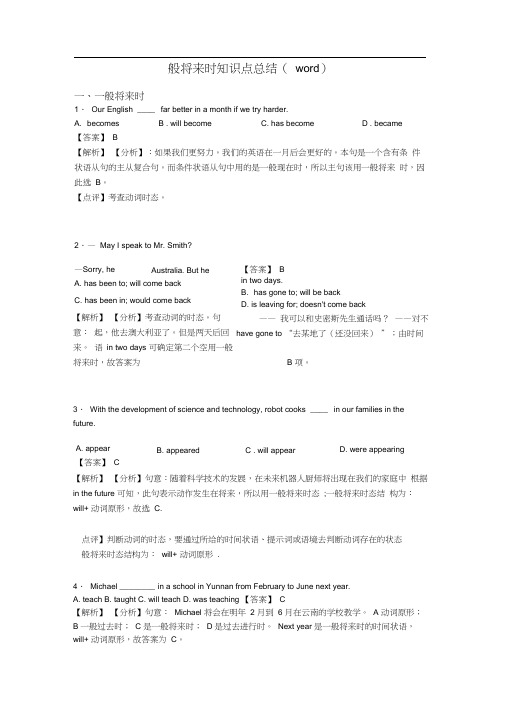
般将来时知识点总结( word )一、一般将来时1. Our English ____ far better in a month if we try harder.A. becomes B . will become C. has become D . became【答案】 B【解析】 【分析】:如果我们更努力。
我们的英语在一月后会更好的。
本句是一个含有条 件状语从句的主从复合句。
而条件状语从句中用的是一般现在时,所以主句该用一般将来 时,因此选 B 。
【点评】考查动词时态。
2.— May I speak to Mr. Smith?—Sorry, he A. has been to; will come back C. has been in; would come back【答案】 Bin two days.B. has gone to; will be backD. is leaving for; doesn't come back 【解析】 【分析】考查动词的时态。
句意: 起,他去澳大利亚了。
但是两天后回来。
语 in two days 可确定第二个空用一般将来时,故答案为 B 项。
3. With the development of science and technology, robot cooks ____ in our families in thefuture.【解析】 【分析】句意:随着科学技术的发展,在未来机器人厨师将出现在我们的家庭中 根据 in the future 可知,此句表示动作发生在将来,所以用一般将来时态 ;一般将来时态结 构为: will+ 动词原形,故选 C.点评】判断动词的时态,要通过所给的时间状语、提示词或语境去判断动词存在的状态般将来时态结构为: will+ 动词原形 .4. Michael ________ in a school in Yunnan from February to June next year.A. teachB. taughtC. will teachD. was teaching 【答案】 C【解析】 【分析】句意: Michael 将会在明年 2 月到 6 月在云南的学校教学。
一般将来时知识点总结

【解析】【分析】句意:——我想知道他今天晚上是否加入我们吗?——我相信如果他完成了作业,他会加入我们的。根据句式结构第一句是if是否,引导宾语从句,根据tonight,可知从句是将来时态;第二句if如果,引导条件状语从句,时态为主将从现,此空用一般现在时,finishes,故选B。
【点评】此题考查从句时态。要根据不同的从句和不同的语境确定句子时态。
【点评】考查时态take an umbrella. The weather report says itin the afternoon.
— Thank you. I will put one in my bag.
A. will rain B. rains C. is raining
【答案】B
【解析】【分析】这是一道考查一般将来时以及as soon as结构使用的题目。
句意:你知道他明天什么时候来吗?不用担心,我认为他来了,他会给你打电话的。由tomorrow知第一句为一般将来时,故第一个空填will come形式;as soon as引导时间状语从句,主句用一般将来时,从句用一般现在时表一般将来时,故第二个空填comes。故选B。
一般将来时知识点总结
一、一般将来时
1.— Have you watched the new movie Jurassic World, Steven?
— Not yet. I ________ it with my cousin this evening.
A. will watch B. was watching C. watched D. have watched
【点评】考查动词的时态。
15.—I wonder if he ______ us tonight.
高中英语一般将来时知识点总结

高中英语一般将来时知识点总结高中英语一般将来时知识11.1 一般将来时的构成肯定句:主语 + shall/will + 动词原形...否定句:主语 + shall/will + not + 动词原形...疑问句:Shall/Will + 主语 + 动词原形...?疑问代词/疑问副词 + shall/will + 主语 + 动词原形...?1.2 一般将来时的肯定句句型:主语 + shall/will + 动词原形....在书面语中,如果主语是第一人称,常用“助动词shall + 动词原形”构成一般将来时的肯定句,即“I/we + shall + 动词原形”;shall可缩写为'll:If I have time tomorrow,I think I'll get a haircut.如果我明天有时间,我想去理个发在口语中,所有的人称都可以用will,即“主语(所有人称) + will + 动词原形...”;will可缩写为'll:Some day,I'll tell you.将来某一天我会告诉你的。
1.3 一般将来时的否定句句型:主语 + will/shall + not + 动词原形...一般将来时的否定句是在will/shall后加not;will not可缩写为won't;shall not可缩写为shan't:Mary won't go to the party.玛丽不会去参加晚会。
1.4 一般将来时的一般疑问句句型:Shall/Will + 主语 + 动词原形...回答方式:Yes,主语 + shall/will.No,主语 + shall/will + not.一般将来时的一般疑问句是将助动词shall/will置于主语之前(大写shall/will的第一个字母),在句尾加问号;这种语序是主语和谓语倒装语序:Will he come? 他来吗?Will you be at our next meeting? 我们下次开会你来吗?Will you be free tonight? —Yes,I will./No,I won't(be free).今晚你有空吗? ——是,我有空。
初中英语知识点总结:一般将来时

初中英语知识点总结初中英语知识点总结 第 1 页 共2 页 初中英语知识点总结:一般将来时(1)一般将来时表示将要发生的动作或存在的状态。
常与表示将来的时间状语连用:tomorrow, next week, next month, in a few days, from now on 。
如。
如I ’m going to visit the museum this Sunday.I ’ll be there in half an hour.We ’ll arrive tomorrow.(2)一般将来时的构成)一般将来时的构成①be going to + 动词原形。
Be 随主语人称和数的变化而变化,否定句在be 后面加not, 疑问句是将be 放到主语之后。
例如:放到主语之后。
例如: It ’s going to be fine tomorrow.He isn ’t going to speak at the mee ng.What are you going to do next?②will +动词原形。
Will 可以和各种人称及数的主语连用。
否定句在will 后加not,缩写成won ’t ,疑问句需将will 提至主语之前。
例如:提至主语之前。
例如: We will have a basketball match next week.Will you come to the party?I son ’t lend it to you.③shall + 动词原形。
此结构常用于主语为第人称I / we 的句中,疑问句表示提建议或征求意见。
如:问句表示提建议或征求意见。
如:When and where shall we meet ?Shall I turn on the TV ?初中英语知识点总结初中英语知识点总结 第 2 页 共 2 页 (3) 一般将来时的基本用法。
一般将来时的基本用法。
① “be going to +动词原形”表示“意图”,即打算、计划要做某事。
一般将来时+总结
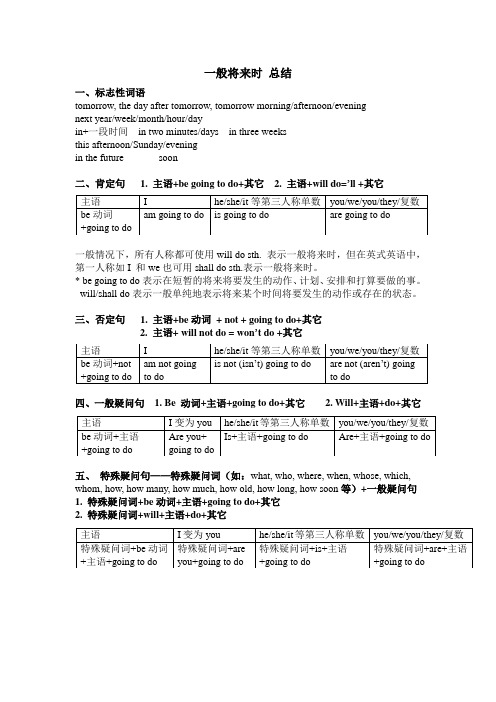
一般将来时总结
一、标志性词语
tomorrow, the day after tomorrow, tomorrow morning/afternoon/evening
next year/week/month/hour/day
in+一段时间in two minutes/days in three weeks
this afternoon/Sunday/evening
in the future soon
二、肯定句 1. 主语+be going to do+其它 2. 主语+will do=’ll +其它
一般情况下,所有人称都可使用will do sth. 表示一般将来时,但在英式英语中,第一人称如I 和we也可用shall do sth.表示一般将来时。
* be going to do表示在短暂的将来将要发生的动作、计划、安排和打算要做的事。
will/shall do表示一般单纯地表示将来某个时间将要发生的动作或存在的状态。
三、否定句 1. 主语+be动词+ not + going to do+其它
2. 主语+ will not do = won’t do +其它
四、一般疑问句 1. Be 动词+主语+going to do+其它 2. Will+主语+do+其它
五、特殊疑问句——特殊疑问词(如:what, who, where, when, whose, which, whom, how, how many, how much, how old, how long, how soon等)+一般疑问句
1. 特殊疑问词+be动词+主语+going to do+其它
2. 特殊疑问词+will+主语+do+其它。
一般将来时知识点总结
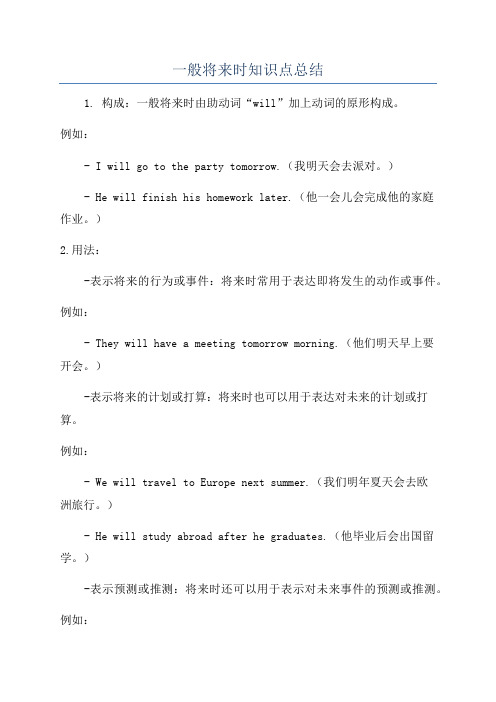
一般将来时知识点总结1. 构成:一般将来时由助动词“will”加上动词的原形构成。
例如:- I will go to the party tomorrow.(我明天会去派对。
)- He will finish his homework later.(他一会儿会完成他的家庭作业。
)2.用法:-表示将来的行为或事件:将来时常用于表达即将发生的动作或事件。
例如:- They will have a meeting tomorrow morning.(他们明天早上要开会。
)-表示将来的计划或打算:将来时也可以用于表达对未来的计划或打算。
例如:- We will travel to Europe next summer.(我们明年夏天会去欧洲旅行。
)- He will study abroad after he graduates.(他毕业后会出国留学。
)-表示预测或推测:将来时还可以用于表示对未来事件的预测或推测。
例如:- It will rain tomorrow.(明天会下雨。
)3.特殊用法:- be going to:此结构用于表示对未来的计划或打算,意义与一般将来时相近。
例如:- They are going to get married next month.(他们下个月打算结婚。
)- She is going to start a new job next week.(她下周将开始新的工作。
)- be about to:此结构用于表示即将发生的行为或事件,常含有紧迫感。
例如:- The show is about to begin.(演出即将开始。
)- I am about to leave for the airport.(我即将出发去机场。
)4.时间和条件状语:-时间状语:一般将来时常常与时间状语连用,表示动作发生的时间。
例如:tomorrow(明天)、next week(下周)、in the future(将来)-条件状语:一般将来时也可以与条件状语连用,表示其中一种条件下的将来动作。
一般将来时大总结
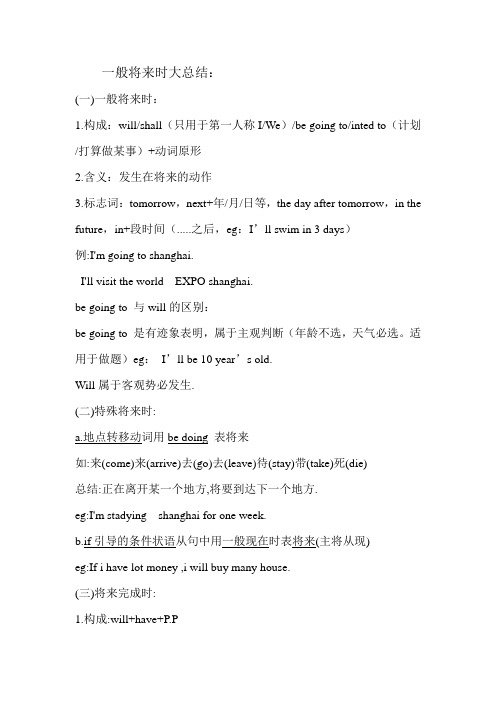
一般将来时大总结:(一)一般将来时:1.构成:will/shall(只用于第一人称I/We)/be going to/inted to(计划/打算做某事)+动词原形2.含义:发生在将来的动作3.标志词:tomorrow,next+年/月/日等,the day after tomorrow,in the future,in+段时间(.....之后,eg:I’ll swim in 3 days)例:I'm going to shanghai.I'll visit the world EXPO shanghai.be going to 与will的区别:be going to 是有迹象表明,属于主观判断(年龄不选,天气必选。
适用于做题)eg:I’ll be 10 year’s old.Will属于客观势必发生.(二)特殊将来时:a.地点转移动词用be doing 表将来如:来(come)来(arrive)去(go)去(leave)待(stay)带(take)死(die)总结:正在离开某一个地方,将要到达下一个地方.eg:I'm stadying shanghai for one week.b.if引导的条件状语从句中用一般现在时表将来(主将从现)eg:If i have lot money ,i will buy many house.(三)将来完成时:1.构成:will+have+P.P肯定句:主语+will+have+p.p否定句:主语+will+have+not+p.p一般疑问句:will+主语+have+p.peg:I will have learnt NCE2 by the end of next year.(到明年年底,我将要学完新2这本书)疑问句:Will you have learnt NCE2 by the end of next year?2.含义:将来完成的动作3.标志词:by+将来时间。
一般将来时用法总结
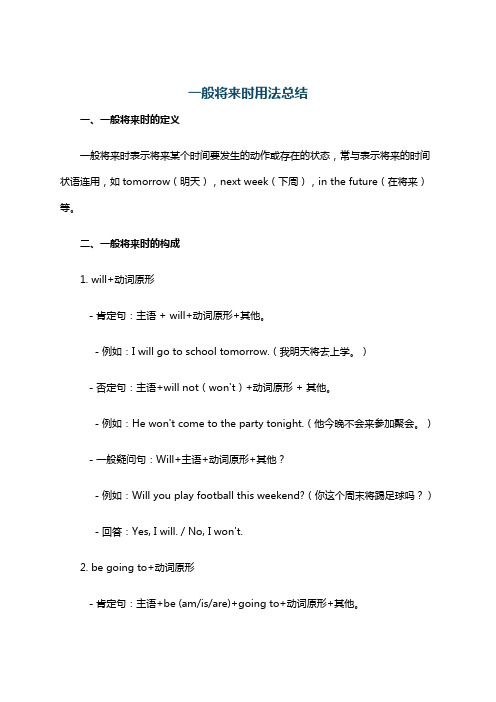
一般将来时用法总结一、一般将来时的定义一般将来时表示将来某个时间要发生的动作或存在的状态,常与表示将来的时间状语连用,如tomorrow(明天),next week(下周),in the future(在将来)等。
二、一般将来时的构成1. will+动词原形- 肯定句:主语 + will+动词原形+其他。
- 例如:I will go to school tomorrow.(我明天将去上学。
)- 否定句:主语+will not(won't)+动词原形 + 其他。
- 例如:He won't come to the party tonight.(他今晚不会来参加聚会。
) - 一般疑问句:Will+主语+动词原形+其他?- 例如:Will you play football this weekend?(你这个周末将踢足球吗?) - 回答:Yes, I will. / No, I won't.2. be going to+动词原形- 肯定句:主语+be (am/is/are)+going to+动词原形+其他。
- 例如:She is going to visit her grandparents next month.(她打算下个月去看望她的祖父母。
)- 否定句:主语+be (am/is/are)+not+going to+动词原形+其他。
- 例如:They are not going to have a meeting this afternoon.(他们今天下午不打算开会。
)- 一般疑问句:Be (am/is/are)+主语+going to+动词原形+其他?- 例如:Are you going to do your homework tonight?(你今晚打算做你的家庭作业吗?)- 回答:Yes, I am. / No, I'm not.三、一般将来时的用法1. 表示将来的计划或打算(be going to侧重于计划打算;will侧重于意愿)- I'm going to study hard this term.(我打算这个学期努力学习。
一般将来时总结
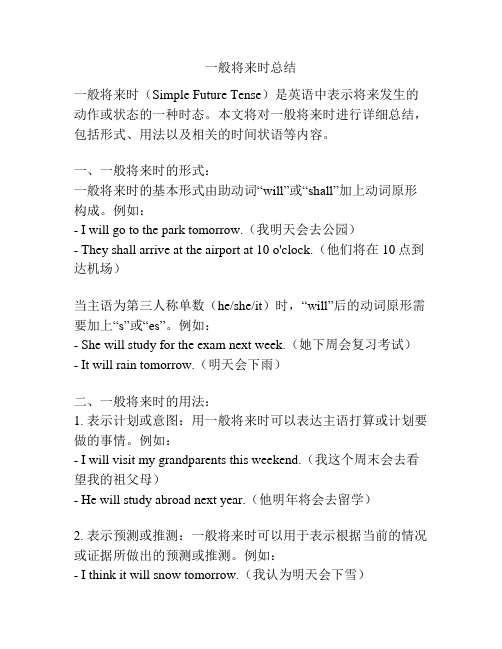
一般将来时总结一般将来时(Simple Future Tense)是英语中表示将来发生的动作或状态的一种时态。
本文将对一般将来时进行详细总结,包括形式、用法以及相关的时间状语等内容。
一、一般将来时的形式:一般将来时的基本形式由助动词“will”或“shall”加上动词原形构成。
例如:- I will go to the park tomorrow.(我明天会去公园)- They shall arrive at the airport at 10 o'clock.(他们将在10点到达机场)当主语为第三人称单数(he/she/it)时,“will”后的动词原形需要加上“s”或“es”。
例如:- She will study for the exam next week.(她下周会复习考试)- It will rain tomorrow.(明天会下雨)二、一般将来时的用法:1. 表示计划或意图:用一般将来时可以表达主语打算或计划要做的事情。
例如:- I will visit my grandparents this weekend.(我这个周末会去看望我的祖父母)- He will study abroad next year.(他明年将会去留学)2. 表示预测或推测:一般将来时可以用于表示根据当前的情况或证据所做出的预测或推测。
例如:- I think it will snow tomorrow.(我认为明天会下雪)- They believe she will win the competition.(他们相信她会赢得比赛)3. 表示意愿或允诺:一般将来时可以表达主语的意愿或承诺要做某事。
例如:- I will help you with your homework.(我会帮你做作业)- He will stop smoking.(他将戒烟)4. 表示预定的事件或安排的计划:一般将来时可以用于表示已经安排好的事件或计划。
英语语法一般将来时归纳总结
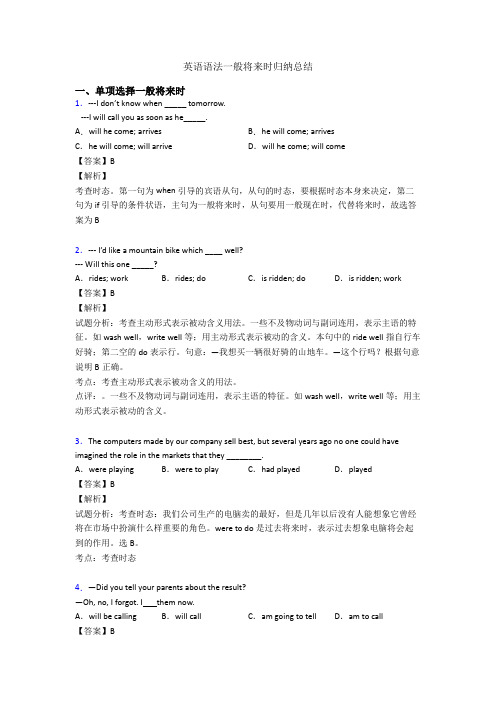
【答案】B
【解析】
试题分析:考查主动形式表示被动含义用法。一些不及物动词与副词连用,表示主语的特征。如wash well,write well等;用主动形式表示被动的含义。本句中的ride well指自行车好骑;第二空的do表示行。句意:—我想买一辆很好骑的山地车。—这个行吗?根据句意说明B正确。
【解析】
试题分析:考查倒装句和时态:句意:只有你每天练习几个小时,你才能把钢琴弹好。Only+副词/介词短语/状语从句+主句(主句用部分倒装),而且这句话的时间是every day,所以用一般现在时will,选D。
考点:考查倒装句和时态
6.(吉林长春高中毕业班第一次调研)—Alas! I have left my key to the office in my car.
【答案】D
【解析】
试题分析:句意:我今天下午4点能和你们总经理说话吗?---对不起先生,他很快就去开会了。时间是soon,所以用一般将来时,这里用现在进行时代替一般将来时,所以选D。
考点:考查时态
9.If our marketing plan succeeds, we _______ the sales by thirty percent next year.
18.The audience is waiting anxiously to see which team______.
A.winsB.would win
C.will winD.had win
【答案】C
【解析】
分析句意,可知当时的比赛结果还没出来,故要用一般将来时。根据句意,可知选C。句意:观众们都在焦急地等待着看哪个队伍。
时态专题总结 一般将来时
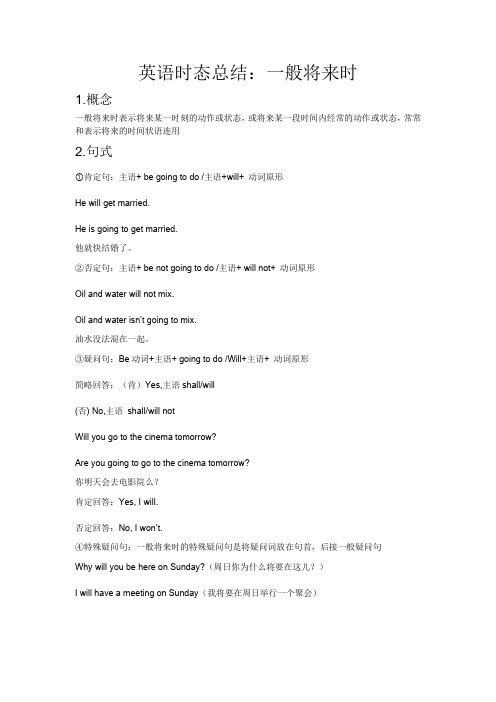
英语时态总结:一般将来时1.概念一般将来时表示将来某一时刻的动作或状态,或将来某一段时间内经常的动作或状态,常常和表示将来的时间状语连用2.句式①肯定句:主语+ be going to do /主语+will+ 动词原形He will get married.He is going to get married.他就快结婚了。
②否定句:主语+ be not going to do /主语+ will not+ 动词原形Oil and water will not mix.Oil and water isn’t going to mix.油水没法混在一起。
③疑问句:Be动词+主语+ going to do /Will+主语+ 动词原形简略回答:(肯)Yes,主语shall/will(否) No,主语shall/will notWill you go to the cinema tomorrow?Are you going to go to the cinema tomorrow?你明天会去电影院么?肯定回答:Yes, I will.否定回答:No, I won’t.④特殊疑问句:一般将来时的特殊疑问句是将疑问词放在句首,后接一般疑问句Why will you be here on Sunday?(周日你为什么将要在这儿?)I will have a meeting on Sunday(我将要在周日举行一个聚会)Telephone me this evening. I‘ll be at home. 今晚给我打电话,我会在家。
I'll(shall/will)do a better job next time. 下次我要干得好The car won‘t start.车开不了啦。
【注:时间状语tomorrow the day after tomorrowtomorrow morning afternoonevening next yearweek monthhour daycentury in+一段时间in the future this afternoonSunday eveningfrom now on one daysomeday soon】3.will和shall的辨析will和shall在句子中所表达的“意志”是不同的,当句子主语是第一人称(I)的时候表示的是主语I 的自主“意志”例:I will get up early tomorrow . 我明天会早起。
一般将来时知识点总结讲解学习

一般将来时知识点总结讲解学习一般将来时是英语语法中的一种时态,用于表示将来一些时间将会发生的动作或状态。
它常常与表示将来的时间状语连用,如tomorrow(明天)、next week(下周)、in the future(将来)等。
下面是一般将来时的知识点总结和讲解。
一、一般将来时的构成1. 肯定句结构:主语 + will + 动词原形例如:I will go to the park tomorrow.2. 否定句结构:主语 + will not(won't)+ 动词原形例如:She won't watch TV tonight.3. 疑问句结构:Will + 主语 + 动词原形 + 其他?例如:Will you have dinner with us?二、一般将来时的用法1.表示将来的计划、打算或意图例如:They will visit their grandparents next month.2.表示预测、推测或猜测例如:I think it will rain tomorrow.3.表示请求、邀请、建议或命令例如:Will you please pass me the salt?4.表示承诺、威胁或警告例如:I will help you with the project.5.在主句中的时间状语从句中,一般将来时常常用于表示将来的动作或状态。
例如:I will go shopping when I finish my work.三、一般将来时的注意事项1.一般将来时表示先于现在或过去的将来动作或状态,与现在的决定或打算无关。
例如:I will study abroad next year. (现在决定)2. be动词的一般将来时构成为will be,否定形式为will not be (won't be)。
例如:He will be at home tomorrow.3.一般将来时常常与表示将来的时间状语连用。
一般将来时知识点总结
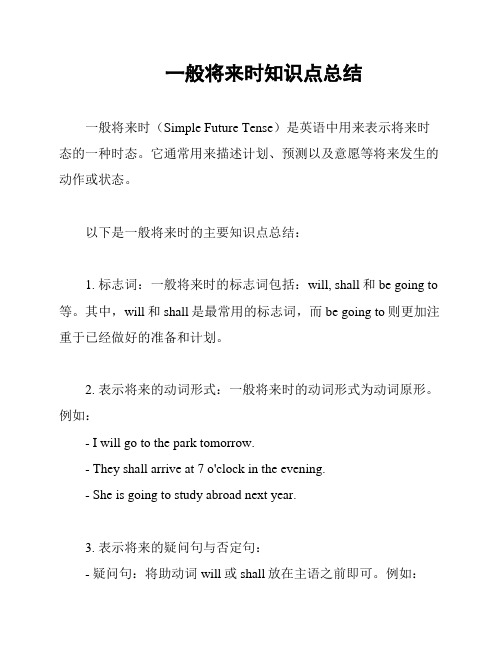
一般将来时知识点总结一般将来时(Simple Future Tense)是英语中用来表示将来时态的一种时态。
它通常用来描述计划、预测以及意愿等将来发生的动作或状态。
以下是一般将来时的主要知识点总结:1. 标志词:一般将来时的标志词包括:will, shall和be going to 等。
其中,will和shall是最常用的标志词,而be going to则更加注重于已经做好的准备和计划。
2. 表示将来的动词形式:一般将来时的动词形式为动词原形。
例如:- I will go to the park tomorrow.- They shall arrive at 7 o'clock in the evening.- She is going to study abroad next year.3. 表示将来的疑问句与否定句:- 疑问句:将助动词will或shall放在主语之前即可。
例如:- Shall we start the meeting now?- 否定句:在will或shall后面加上not即可。
例如:- I will not forget your birthday.- They shall not pass the exam.4. 表示将来的时间状语:- 一般将来时通常与一些表示将来的时间状语连用,例如:tomorrow, next week, in the future等。
例如:- She will visit her parents tomorrow.- I am going to travel abroad next month.总结:一般将来时是用来表达将来发生的动作或状态的时态。
通过掌握标志词、动词形式、疑问句与否定句以及时间状语等知识点,我们可以更加准确地使用一般将来时来表达自己的意思。
一般将来时语法总结归纳
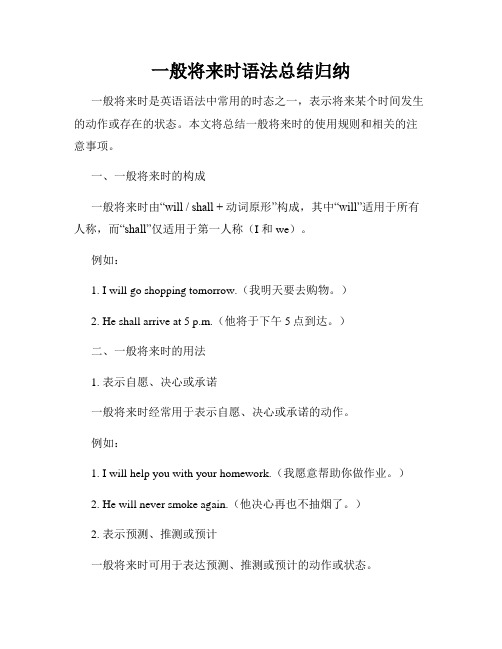
一般将来时语法总结归纳一般将来时是英语语法中常用的时态之一,表示将来某个时间发生的动作或存在的状态。
本文将总结一般将来时的使用规则和相关的注意事项。
一、一般将来时的构成一般将来时由“will / shall + 动词原形”构成,其中“will”适用于所有人称,而“shall”仅适用于第一人称(I 和 we)。
例如:1. I will go shopping tomorrow.(我明天要去购物。
)2. He shall arrive at 5 p.m.(他将于下午5点到达。
)二、一般将来时的用法1. 表示自愿、决心或承诺一般将来时经常用于表示自愿、决心或承诺的动作。
例如:1. I will help you with your homework.(我愿意帮助你做作业。
)2. He will never smoke again.(他决心再也不抽烟了。
)2. 表示预测、推测或预计一般将来时可用于表达预测、推测或预计的动作或状态。
例如:1. It will rain tomorrow.(明天会下雨。
)2. They will probably win the game.(他们很可能会赢得比赛。
)3. 表示习惯或反复发生的动作一般将来时可以用来表示根据过去的行为或事件推断将来会发生的动作。
例如:1. He will often call his parents.(他通常会给父母打电话。
)2. They will always eat dinner at home.(他们总是在家吃晚餐。
)4. 表示请求、邀请或建议一般将来时也可用于表示请求、邀请或建议的动作。
例如:1. Will you please close the window?(请你关上窗户好吗?)2. Shall we meet at the café?(我们要在咖啡馆见面吗?)三、注意事项1. 否定形式将"will not"缩写为"won't",放在动词之前。
英语中一般将来时的总结与练习题

英语中一般将来时的总结与练习题一、一般将来时的总结1. 一般将来时的定义一般将来时表示将来某个时间要发生的动作或存在的状态,也常用于表示将来一段时间内的经常性动作或状态。
在英语中,一般将来时主要由助动词“will”或“shall”(第一人称)加动词原形构成。
此外,“be going to + 动词原形”也可表示将来时,常用于根据目前已知的情况预测未来即将发生的动作或状态。
2. 一般将来时的常见形式•“will + 动词原形”•“shall + 动词原形”(第一人称)•“be going to + 动词原形”•“be to do”结构(表示按计划或安排即将发生的动作)•“be about to + 动词原形”(表示即将发生的动作,不能与表示将来的时间状语连用)3. 一般将来时的用法•表示将来的动作或状态,通常与表示将来的时间状语连用,如“tomorrow”, “next year”, “in the future”等。
•表示根据现有情况推测未来可能发生的动作或状态,常用于“be going to”结构中。
•表示计划、安排或打算做的事情,常与“be to do”结构连用。
4. 与其他时态的区别•与现在进行时区别:现在进行时表示正在进行的动作,而一般将来时表示将来某个时间要发生的动作。
•与现在完成时区别:现在完成时表示过去发生的动作对现在造成的影响或结果,而一般将来时则表示未来即将发生的动作。
二、一般将来时的练习题1. 选择题(1) —_____ you _____ a party next weekend?—Yes, we will.A. Will; haveB. Are; havingC. Do; haveD. Are; go to have(2) They _____ a meeting this afternoon.A. are havingB. are going to haveC. will havingD. will have(3) —_____ you _____ your homework before you watch TV?—Yes, I _____.A. Will; do; willB. Are; doing; amC. Are; going to do; amD. Will; do; am2. 填空题(1) I _____ (meet) my friend at the airport tomorrow.(2) They _____ (not go) to the zoo if it rains.(3) We _____ (have) a picnic next Sunday. Will you join us?3. 翻译题(1) 明天我要去看望我的祖父母。
一般将来时语法知识点总结

一般将来时语法知识点总结一般将来时是表示将来发生的动作或状态的一种时态。
一般将来时的构成由助动词“will”(或情态动词“shall”在第一人称单数中)+动词的原形组成。
以下是一般将来时的相关知识点总结:1. 肯定句结构:主语 + will + 动词原形 + 其他。
例如:- I will go to the movies tomorrow.(我明天会去看电影。
)- She will help you with your homework.(她会帮你做作业。
)2. 否定句结构:主语 + will not / won't + 动词原形 + 其他。
例如:- They won't come to the party.(他们不会来参加派对。
)- He will not eat meat anymore.(他不再吃肉了。
)3. 疑问句结构:Will + 主语 + 动词原形 + 其他?例如:- Will you join us for dinner?(你会和我们一起吃晚饭吗?)- Will they visit their grandparents this weekend?(他们会在这个周末去看望他们的祖父母吗?)4. 表示计划或意愿:表示将来的某个时间或做某件事情的打算或意愿。
例如:- I will study abroad next year.(我明年将出国留学。
)- They will buy a new car soon.(他们很快会买一辆新车。
)5. 表示预测或推断:表示将来的某个状态或事件可能发生,基于推测或判断。
例如:- It will rain tomorrow.(明天会下雨。
)- She will probably pass the exam.(她可能会通过考试。
)需要注意的是,一般将来时有时可用于表示即将发生的动作,而不一定是将来的某个时间。
例如,当说话人决定或做出决定时,也可以使用一般将来时。
一般将来时总结
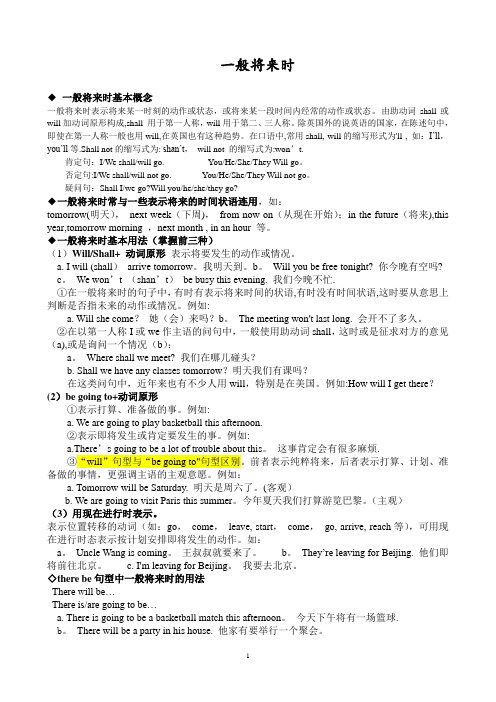
一般将来时◆一般将来时基本概念一般将来时表示将来某一时刻的动作或状态,或将来某一段时间内经常的动作或状态。
由助动词shall或will加动词原形构成,shall 用于第一人称,will用于第二、三人称。
除英国外的说英语的国家,在陈述句中,即使在第一人称一般也用will,在英国也有这种趋势。
在口语中,常用shall, will的缩写形式为'll , 如:I’ll,you’ll等.Shall not的缩写式为: shan’t,will not 的缩写式为:won’t.肯定句:I/We shall/will go. You/He/She/They Will go。
否定句:I/We shall/will not go. You/He/She/They Will not go。
疑问句:Shall I/we go?Will you/he/she/they go?◆一般将来时常与一些表示将来的时间状语连用,如:tomorrow(明天),next week(下周),from now on(从现在开始);in the future(将来),this year,tomorrow morning ,next month , in an hour 等。
◆一般将来时基本用法(掌握前三种)(1)Will/Shall+ 动词原形表示将要发生的动作或情况。
a. I will (shall)arrive tomorrow。
我明天到。
b。
Will you be free tonight? 你今晚有空吗? c。
We won’t (shan’t)be busy this evening. 我们今晚不忙.①在一般将来时的句子中,有时有表示将来时间的状语,有时没有时间状语,这时要从意思上判断是否指未来的动作或情况。
例如:a. Will she come?她(会)来吗?b。
The meeting won't last long. 会开不了多久。
一般将来时总结
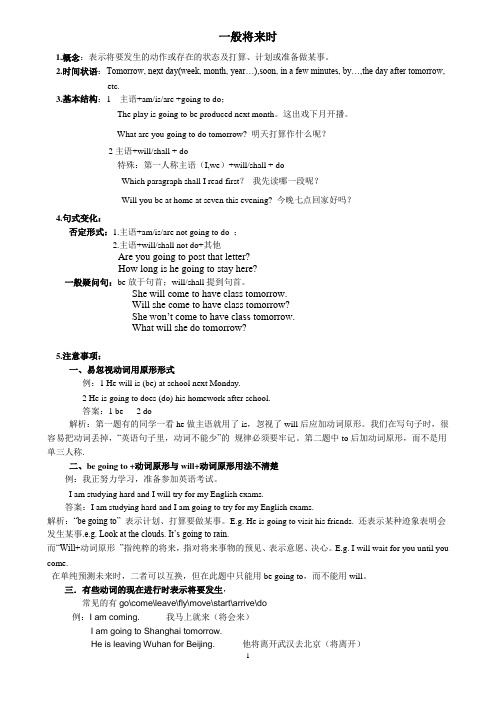
一般将来时1.概念:表示将要发生的动作或存在的状态及打算、计划或准备做某事。
2.时间状语:Tomorrow, next day(week, month, year…),soon, in a few minutes, by…,the day after tomorrow,etc.3.基本结构:1 主语+am/is/are +going to do;The play is going to be produced next month。
这出戏下月开播。
What are you going to do tomorrow? 明天打算作什么呢?2主语+will/shall + do特殊:第一人称主语(I,we)+will/shall + doWhich paragraph shall I read first?我先读哪一段呢?Will you be at home at seven this evening? 今晚七点回家好吗?4.句式变化:否定形式:1.主语+am/is/are not going to do ;2.主语+will/shall not do+其他Are you going to post that letter?How long is he going to stay here?一般疑问句:be放于句首;will/shall提到句首。
She will come to have class tomorrow.Will she come to have class tomorrow?She won’t come to have class tomorrow.What will she do tomorrow?5.注意事项:一、易忽视动词用原形形式例:1 He will is (be) at school next Monday.2 He is going to does (do) his homework after school.答案:1 be 2 do解析:第一题有的同学一看he做主语就用了is,忽视了will后应加动词原形。
- 1、下载文档前请自行甄别文档内容的完整性,平台不提供额外的编辑、内容补充、找答案等附加服务。
- 2、"仅部分预览"的文档,不可在线预览部分如存在完整性等问题,可反馈申请退款(可完整预览的文档不适用该条件!)。
- 3、如文档侵犯您的权益,请联系客服反馈,我们会尽快为您处理(人工客服工作时间:9:00-18:30)。
一般将来时
◆一般将来时基本概念
一般将来时表示将来某一时刻的动作或状态,或将来某一段时间内经常的动作或状态。
由助动词shall或w ill加动词原形构成,shall 用于第一人称,will用于第二、三人称。
除英国外的说英语的国家,在陈述句中,即使在第一人称一般也用will,在英国也有这种趋势。
在口语中,常用shall,will的缩写形式为’ll , 如:I’ll,you’ll等。
Shall not的缩写式为: shan’t,willnot 的缩写式为:won’t.肯定句:I/Weshall/will go. You/He/She/They Willgo.
否定句:I/We shall/willnot go. You/He/She/TheyWillnot go.
疑问句:ShallI/we go?Will you/he/she/they go?
◆一般将来时常与一些表示将来的时间状语连用,如: ﻫtomorrow(明天), nextweek(下周), fromnowon(从现在开始);inthe future(将来),this year,tomorrow morn ing ,next month ,inan hour等。
◆一般将来时基本用法(掌握前三种)
(1)Will/Shall+动词原形表示将要发生的动作或情况。
a. I will (shall)arrive tomorrow.我明天到。
b. Willyou be free tonight?你今晚有空吗?
c. We won’t (shan’t) be busythis evening.我们今晚不忙。
①在一般将来时的句子中,有时有表示将来时间的状语,有时没有时间状语,这时要从意思上判断是否指未来的动作或情况。
例如:
a. Will she come?她(会)来吗?b. Themeeting won’tlast long. 会开不了多久。
②在以第一人称I或we作主语的问句中,一般使用助动词shall,这时或是征求对方的意见(a),或是询问一个情况(b):
a. Where shall we meet? 我们在哪儿碰头?
b. Shallwehave any classestomorrow?明天我们有课吗?
在这类问句中,近年来也有不少人用will,特别是在美国。
例如:How willIget there?
(2)be goingto+动词原形
①表示打算、准备做的事。
例如:
a. We aregoingto play basketballthis afternoon.
②表示即将发生或肯定要发生的事。
例如:
a.There’sgoing to be alotof trouble aboutthis.这事肯定会有很多麻烦。
③“will”句型与“begoing to”句型区别。
前者表示纯粹将来,后者表示打算、计划、准备做的事情,更强调主语的主观意愿。
例如:
a. Tomorrow willbe Saturday. 明天是周六了。
(客观)
b. Weare going to visitParis this summer.今年夏天我们打算游览巴黎。
(主观)
(3)用现在进行时表示。
表示位置转移的动词(如:go,come,leave, start, come,go,arrive, reach等),可用现在进行时态表示按计划安排即将发生的动作。
如:
a.Uncle Wang is coming. 王叔叔就要来了。
b. They’releaving for Beijing.他们即将前往北京。
c. I'm leavingforBeijing.我要去北京。
◇there be句型中一般将来时的用法
There will be…
There is/are goingto be…
a. There is goingto bea basketball match thisafternoon. 今天下午将有一场篮球。
b.There will be a partyinhis house.他家有要举行一个聚会。
(4)用一般现在时表示。
①某些词,如come, go,leave, arrive,start, get, stay,live,fly等的一般现在时也可表示根据规定或时间表预计要发生的动作.
a.The new term starts(begins) on August29th. 新学期八月二十九日开学。
c. Thetrainleaves at 12:00. 火车12点开出。
②当主句为将来时态或表示将来意义时,时间和条件的状语从句必须用一般现在时表将来:
a. If it doesn’train tomorrow,we willgooutfor a picnic. 如果明天不下雨,我们将出去野餐。
b. Turn off thelights beforeyouleave. 走前关灯。
(5)“be to+动词原形”和“be about to+动词原形”表示将来。
①“be to+动词原形”表示按计划要发生的事或征求对方意见。
例如: ﻫa.Are weto go onwiththis work? 我们继续干吗?
b. Theboyisto go to schooltomorrow.这个男孩明天要去上学。
ﻫ
c.He is to visit Japan next year. 明年他将访问日本。
②“be about to+动词原形”表示即将发生的动作,意为:很快,马上。
后面一般不跟时间状语。
a. We are abouttoleave.我们马上就走。
b.I am about to get up, mum. 妈妈,我立刻就起床。
